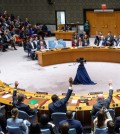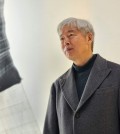- California Assembly OKs highest minimum wage in nation
- S. Korea unveils first graphic cigarette warnings
- US joins with South Korea, Japan in bid to deter North Korea
- LPGA golfer Chun In-gee finally back in action
- S. Korea won’t be top seed in final World Cup qualification round
- US men’s soccer misses 2nd straight Olympics
- US back on track in qualifying with 4-0 win over Guatemala
- High-intensity workout injuries spawn cottage industry
- CDC expands range of Zika mosquitoes into parts of Northeast
- Who knew? ‘The Walking Dead’ is helping families connect
Internationals take jab at unpredictability
By Yoon Ja-young
Foreign business communities in Korea have called for the government to ensure more transparency and predictability to improve the business environment.
They welcomed President Park Geun-hye’s effort for deregulation, including a televised roundtable on deregulation held Thursday, stressing that adopting a negative regulatory scheme should be the first move to address such issues.
“Korea needs to move to a negative regulatory system,” Jeffrey Jones, a lawyer at Kim & Chang law firm, told The Korea Times. Under the system, all regulations are removed except for specifically listed cases
He said the positive regulatory system doesn’t fit today’s business environment which is full of unpredictable changes.
“The business environment, technology, globalization is making it more and more difficult to predict the needs of businesses. The current philosophy and methodology of regulating business by the positive regulatory system simply cannot respond to the current environment and works to prevent growth and new creative ways of doing business,” he said.
Though foreign businesses in Korea acknowledge the government’s efforts to adopt international standards, they say there remains room for improvement to attract investment, and deregulation is the key.
The foreign business community has stressed predictability and transparency of the regulatory environment as most crucial for them to successfully operate in Korea and justify more investment.
“We welcome the president’s strong efforts to deregulate the Korean economy, because deregulation will be key to achieving the Korean government’s goal of attracting more FDI, creating more jobs and reviving the economy,” American Chamber of Commerce in Korea (AMCHAM) President Amy Jackson told The Korea Times.
The European Chamber of Commerce in Korea (ECCK) said Thursday that it has stuck to its earlier view that Korea should make more efforts to create an environment to ensure a level playing field.
“Although we fully understand that regulations are introduced to protect consumers and ensure fair competition in the market, we would like the whole process to be more predictable,” ECCK Chairman Thilo Halter said in an earlier interview.
Paola Bellusci, trade commissioner of the Trade Promotion Section of the Italian Embassy, agreed that there are still problems with Korea’s regulations. “I believe there is still a level of unpredictability which does not depend on Korean trade policies, but on the interpretation of regulations and on the behaviors and daily provisions taken by specific agencies,” she said.
They are also demanding that their voice should be heard in regulatory moves.
Halter has said that they would like to be given more opportunities to voice their opinions and “communicate with the government regarding any changes made in the regulatory environment.”
Jackson also stressed that listening to foreign voices will benefit not only the foreign companies but also the regulators. “We are fully confident that the Korean government will continue to seek specific feedback from the foreign business community on this initiative moving forward,” she said.
















